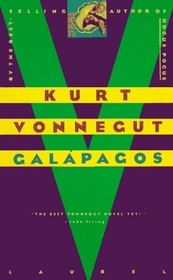Helpful Score: 3
This is truly a fun story told only as Vonnegut could. Placing his narrator (whom is a relation of his recurring character Kilgore Trout) one million years in the future, where man has evolved into a oceanic species with none of the marks of intelligence we know today. It tells the tale of the beginning of the end civilization and the survivors that would be modern man's (of one million years from 1986) forbears. Our narrator also tells us that it is our "over-sized brains" that cause all of our problems. At times startlingly cautionary and always entertaining, any Vonnegut fan would love this read.
Helpful Score: 1
I've kind of intentionally avoided Vonnegut since disliking the couple of books I read by him back in highschool. But, on the urging of many Vonnegut-fans, I agreed to read this one. Well, it was OK.
I might have really liked it if it had been about a fifth of the length it was. It really is a one-joke story, and it stretches out for far too long. It's also much too enamored with its own cleverness.
The concept is that it's narrated from the point of view of a ghost, a million years in the future. He reiterates, repeatedly, that the downfall of humanity was their big brains, and that now that the descendants of humanity have evolved into simple, seal-like creatures, there's no trouble.
And how did we get there? Well, back in the 80's (present, for this book) there was advertised a 'Nature Cruise of the Century' to the Galapagos Islands. It was supposed to be filled with all kinds of celebrities, but due to political and economic strife, most of the scheduled guests don't show up. The destined parents of future humanity are an odd, ragtag bunch...
I might have really liked it if it had been about a fifth of the length it was. It really is a one-joke story, and it stretches out for far too long. It's also much too enamored with its own cleverness.
The concept is that it's narrated from the point of view of a ghost, a million years in the future. He reiterates, repeatedly, that the downfall of humanity was their big brains, and that now that the descendants of humanity have evolved into simple, seal-like creatures, there's no trouble.
And how did we get there? Well, back in the 80's (present, for this book) there was advertised a 'Nature Cruise of the Century' to the Galapagos Islands. It was supposed to be filled with all kinds of celebrities, but due to political and economic strife, most of the scheduled guests don't show up. The destined parents of future humanity are an odd, ragtag bunch...




